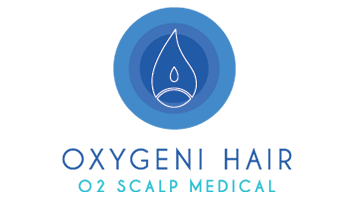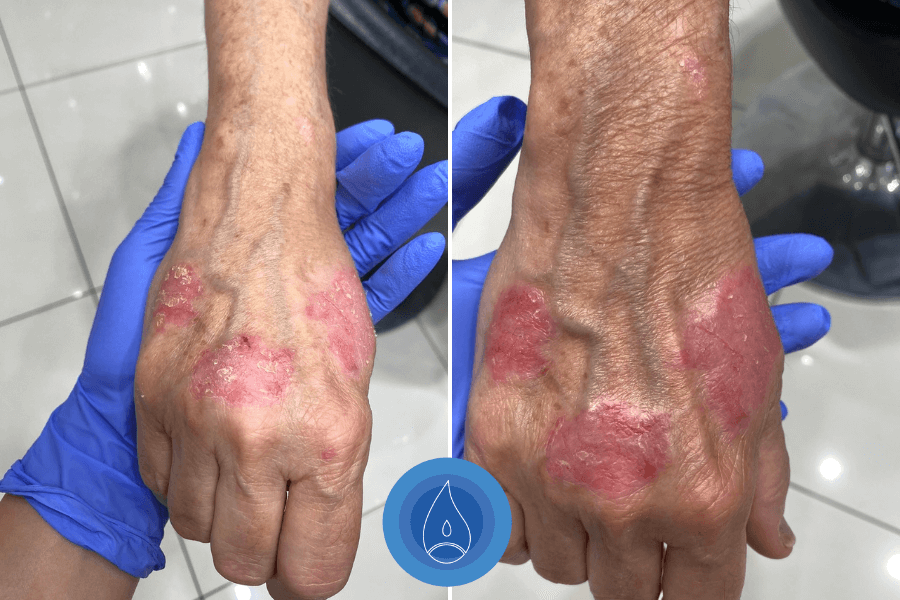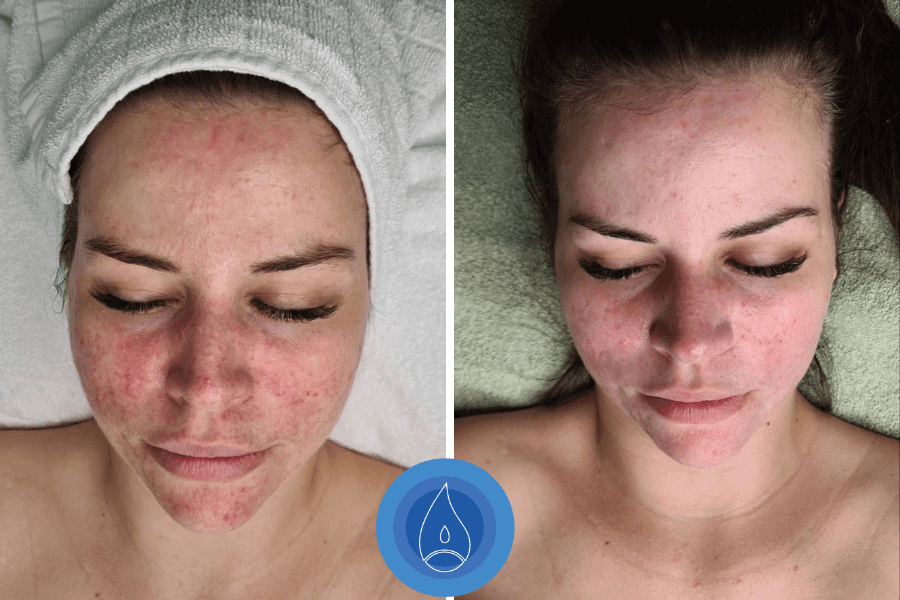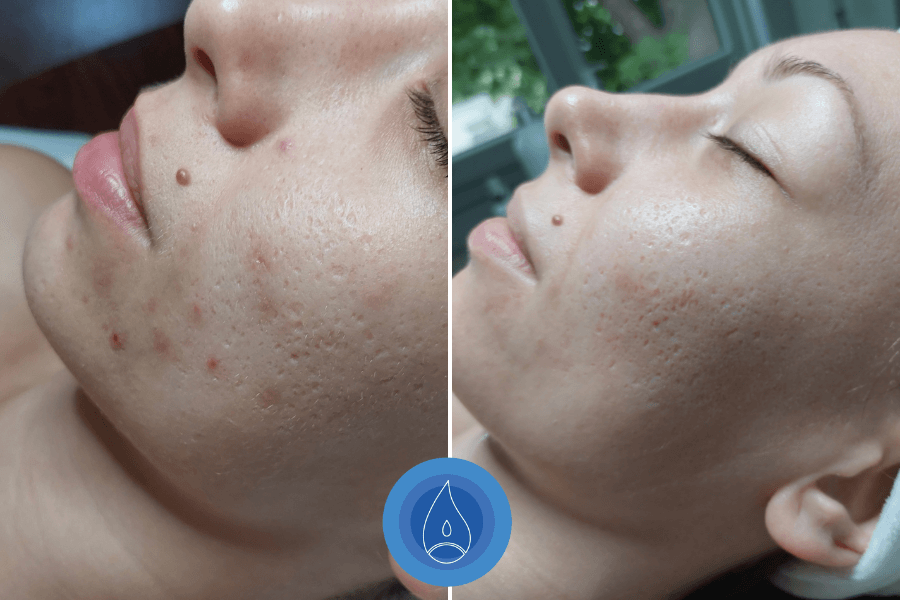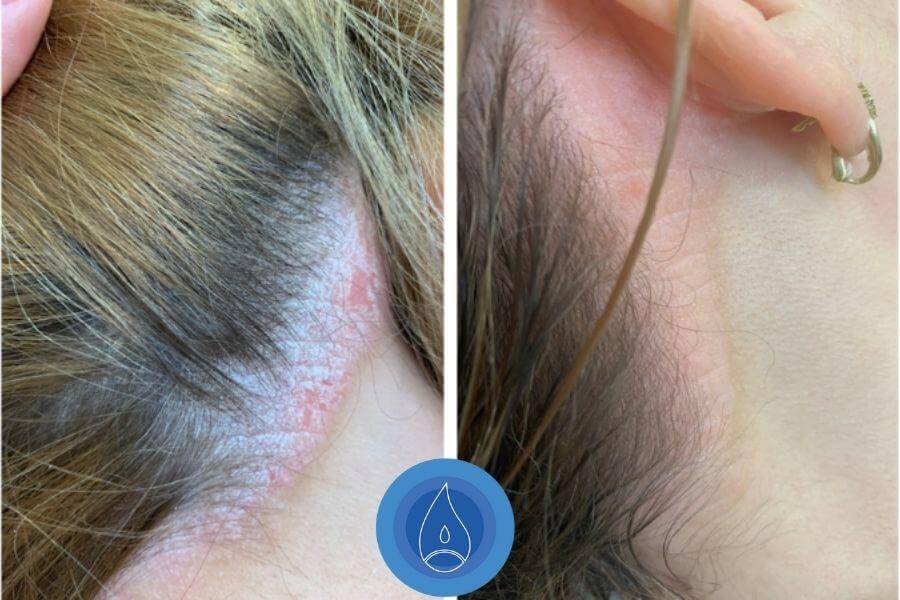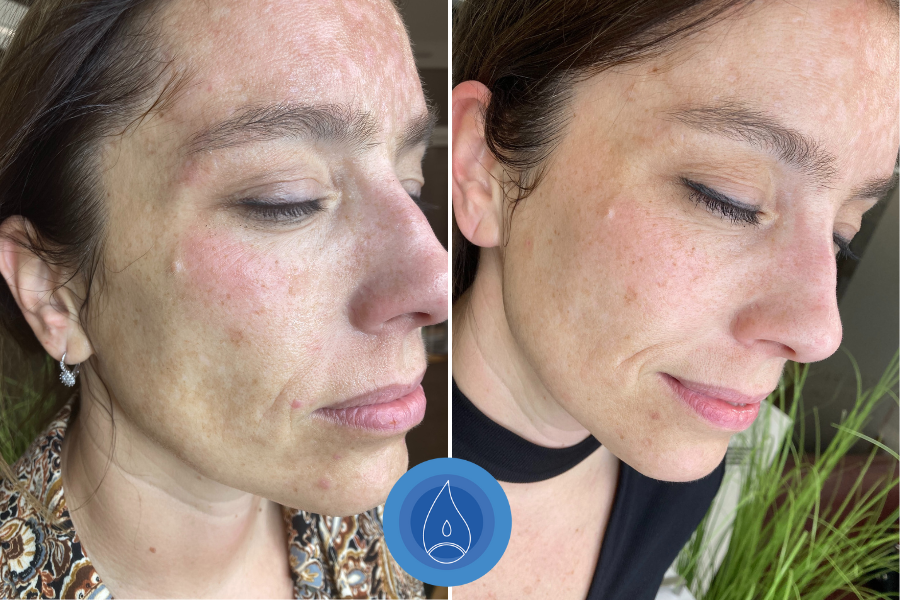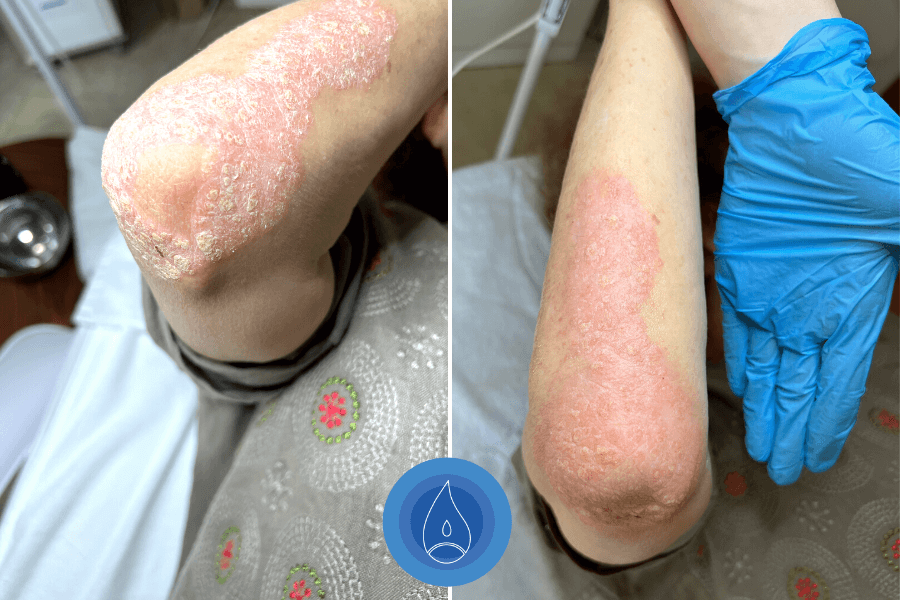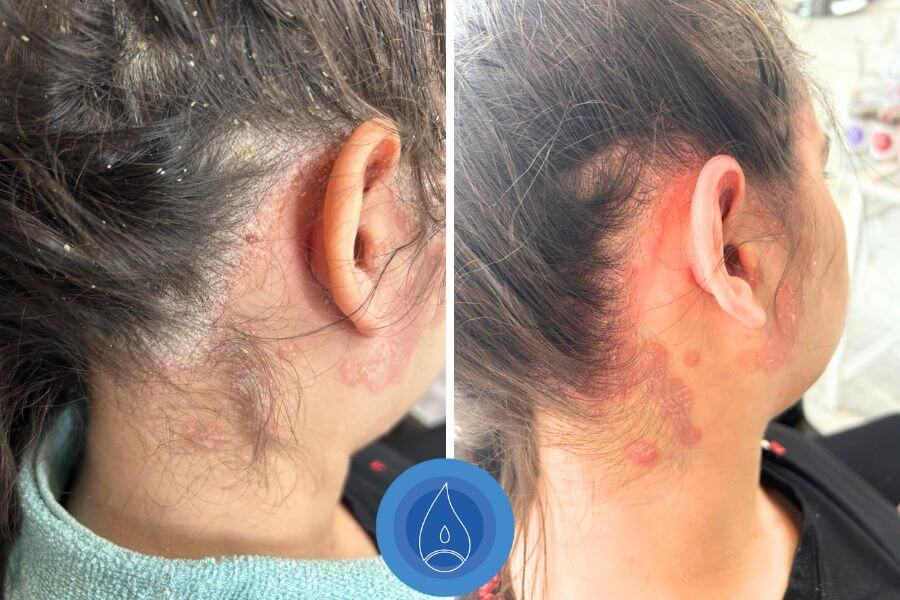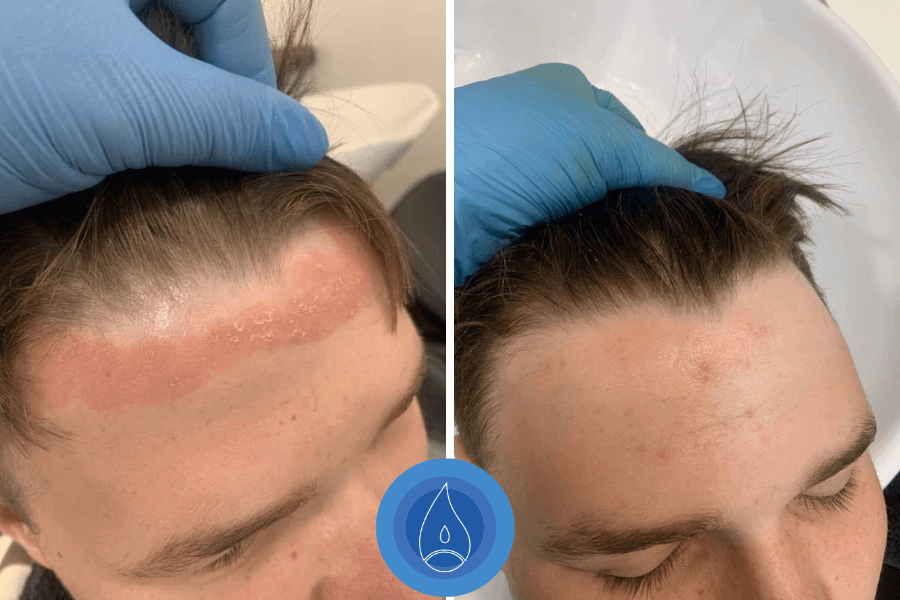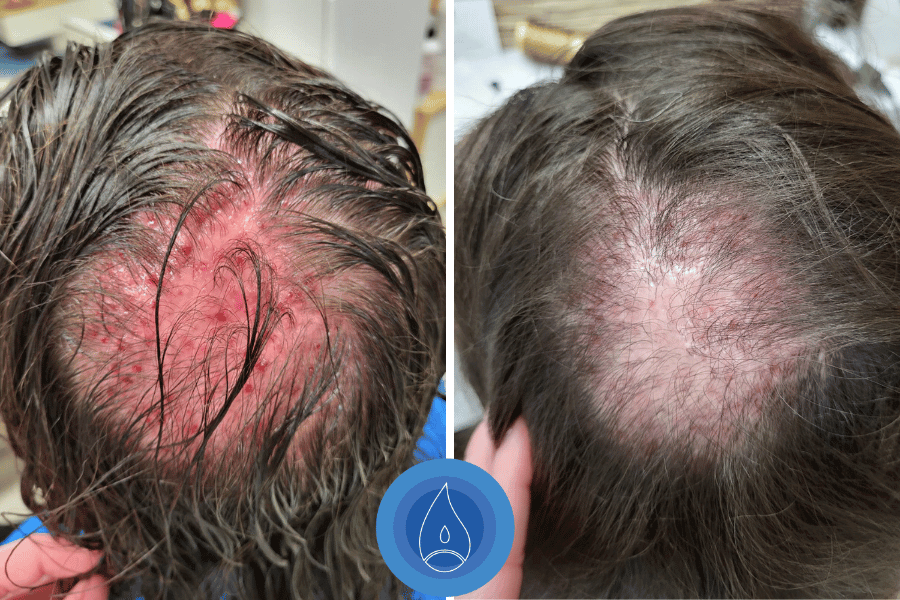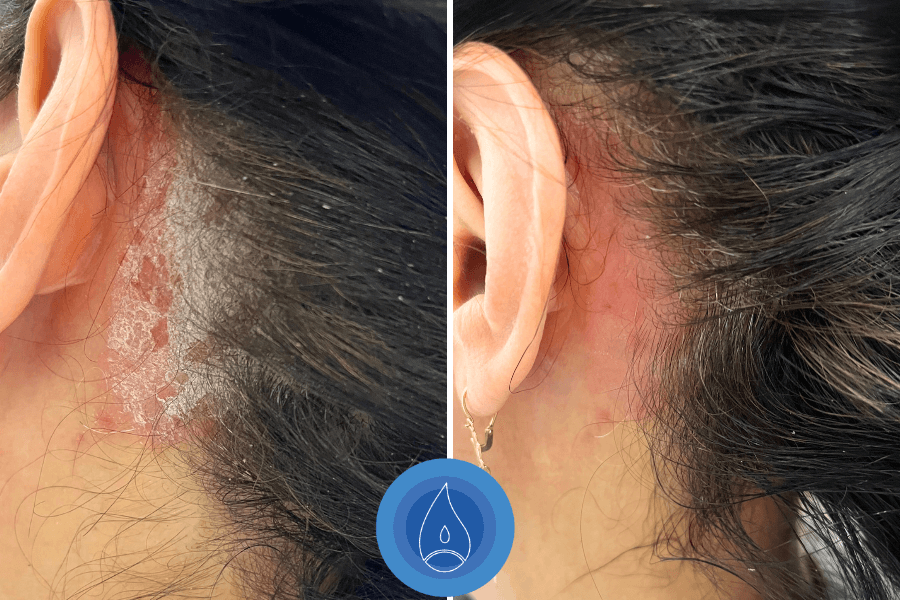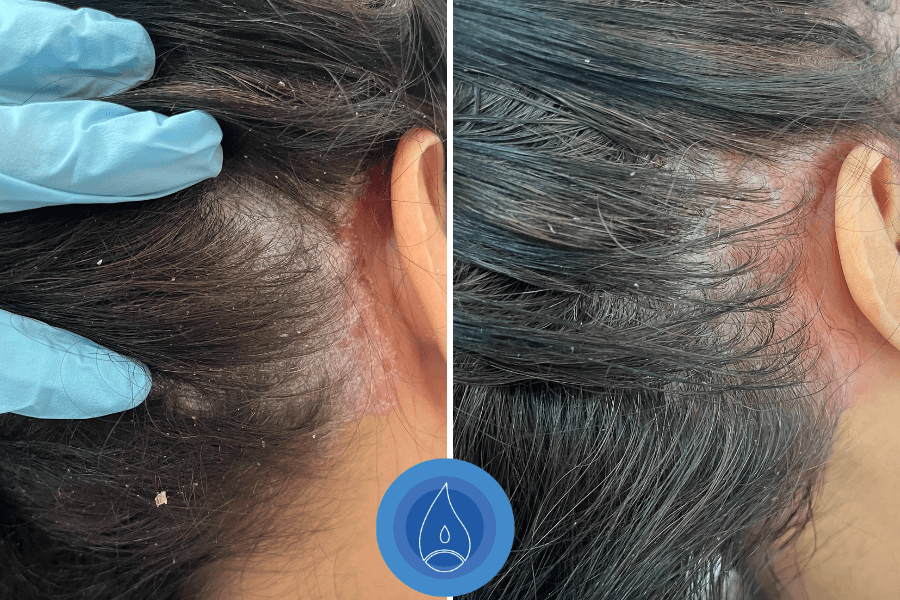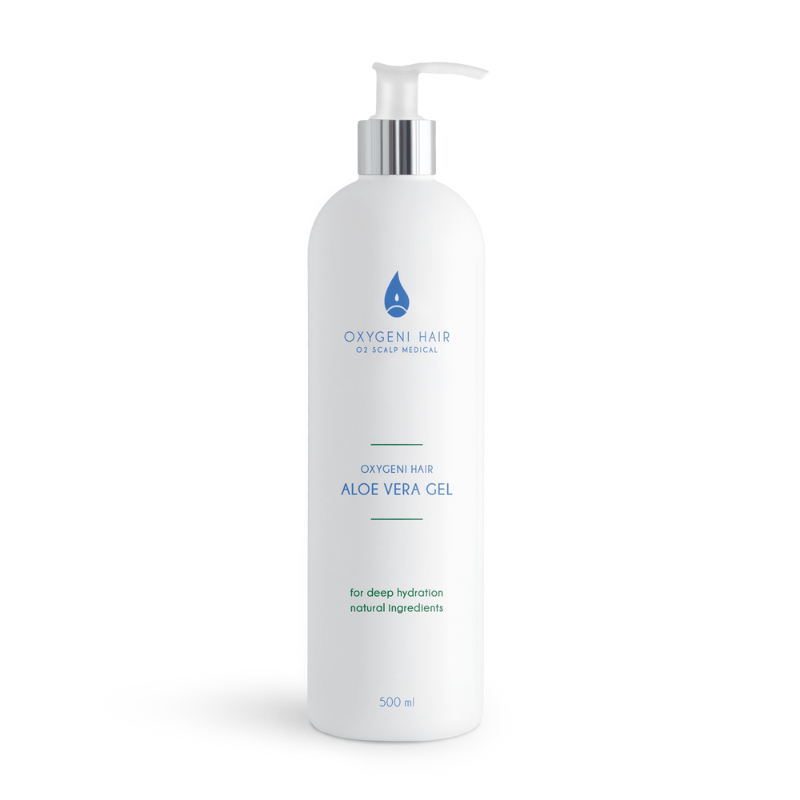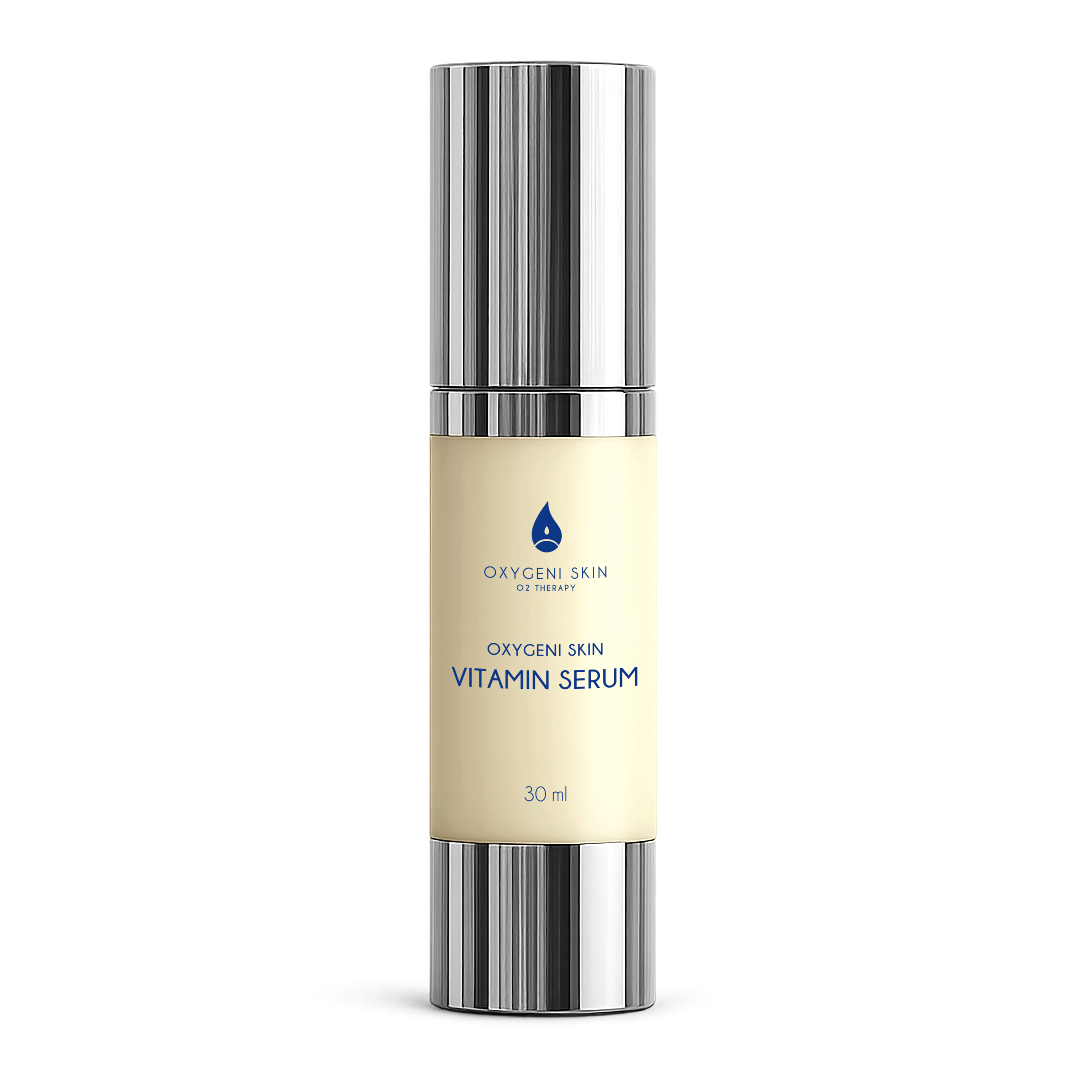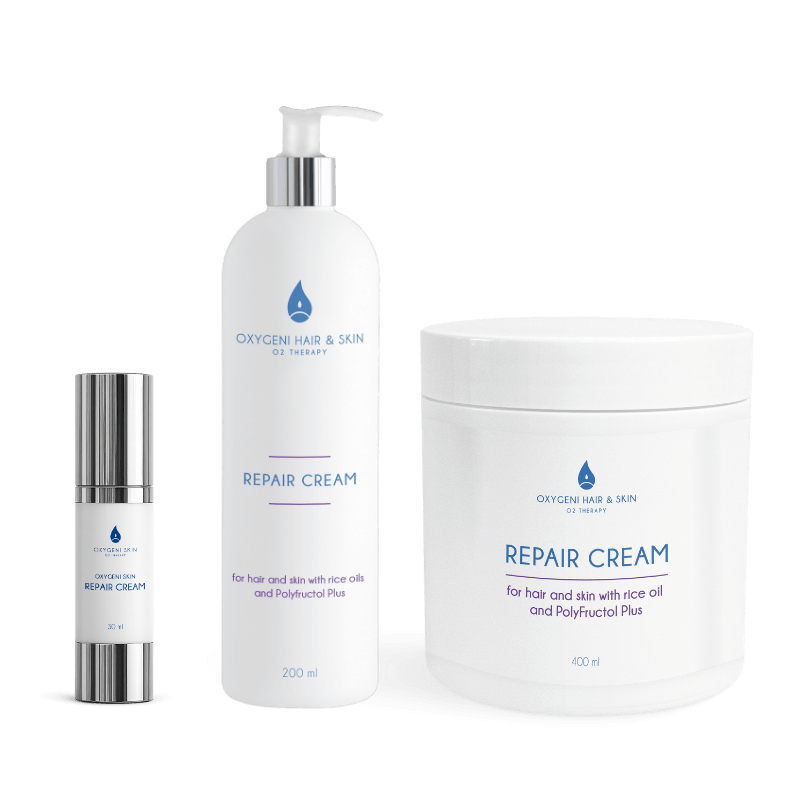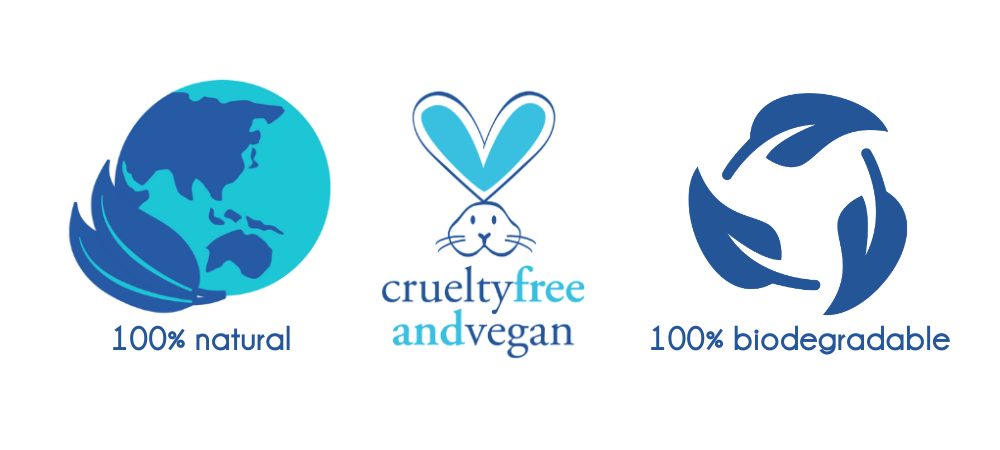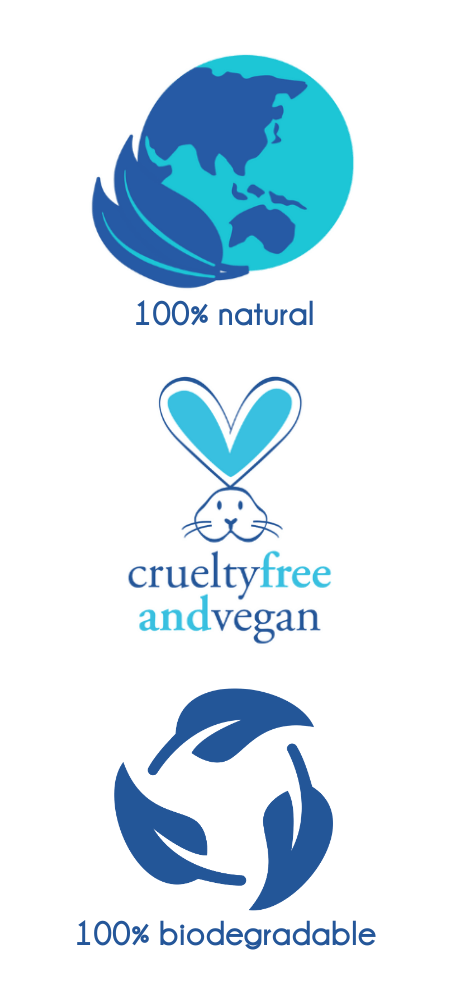Eczema
Eczema
Causes, Symptoms and Treatment
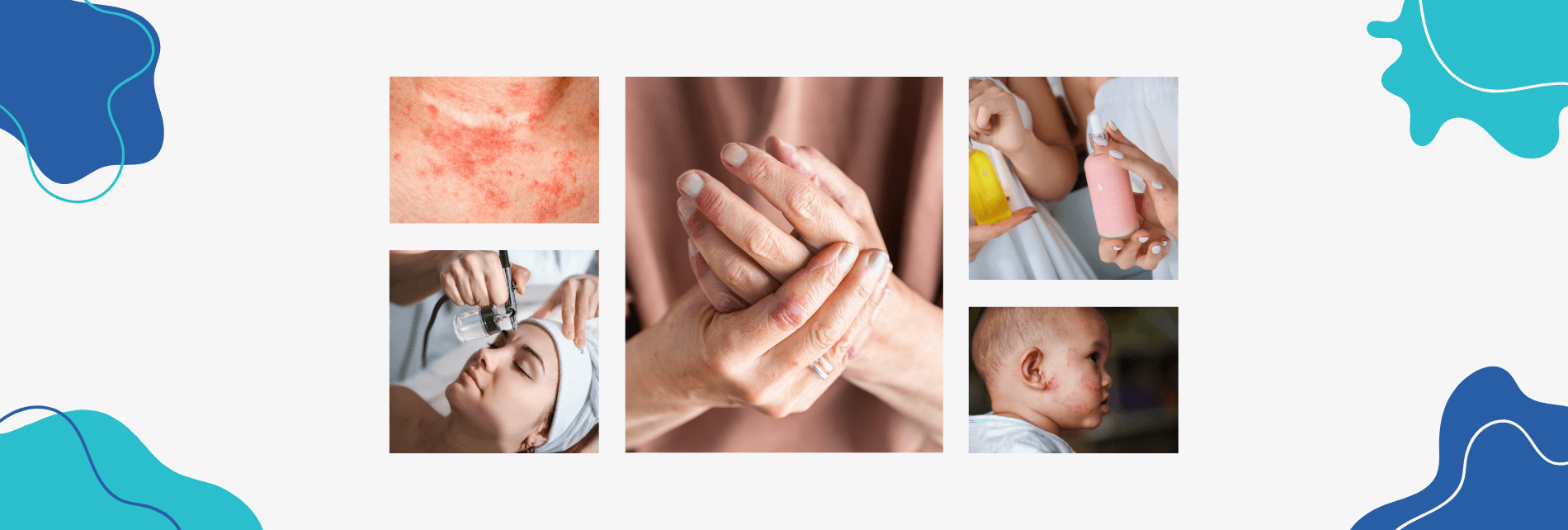
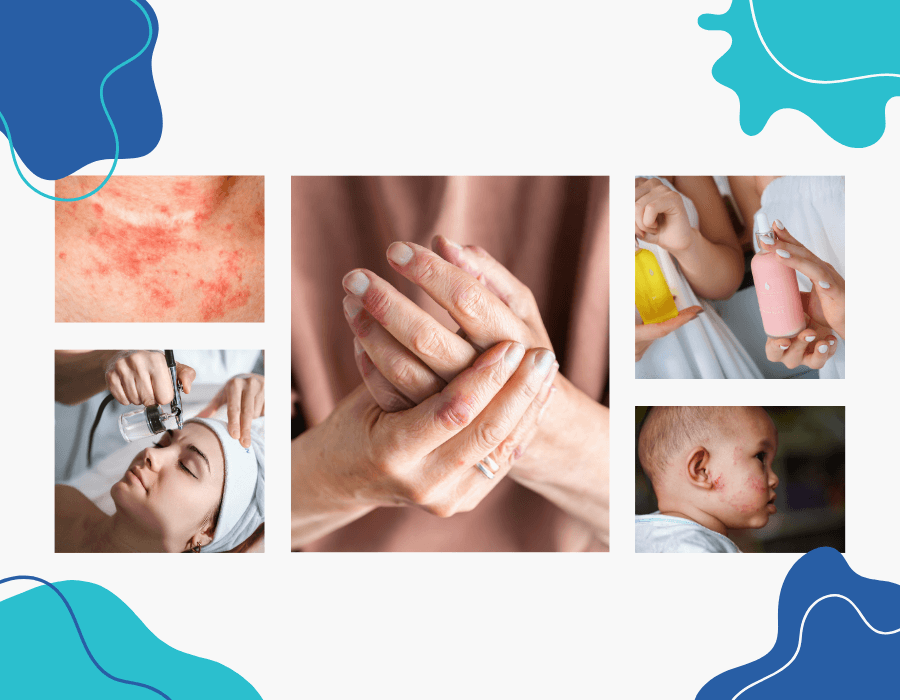
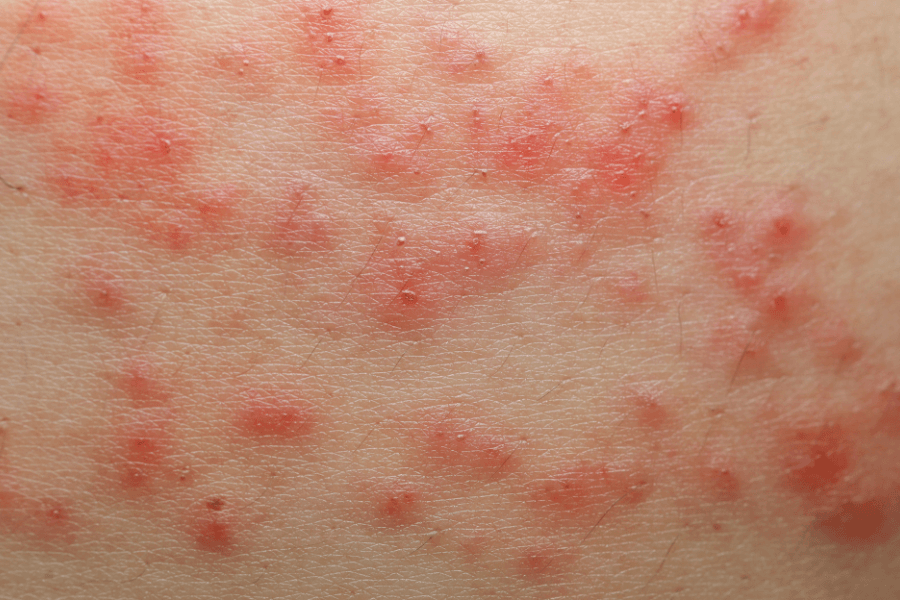
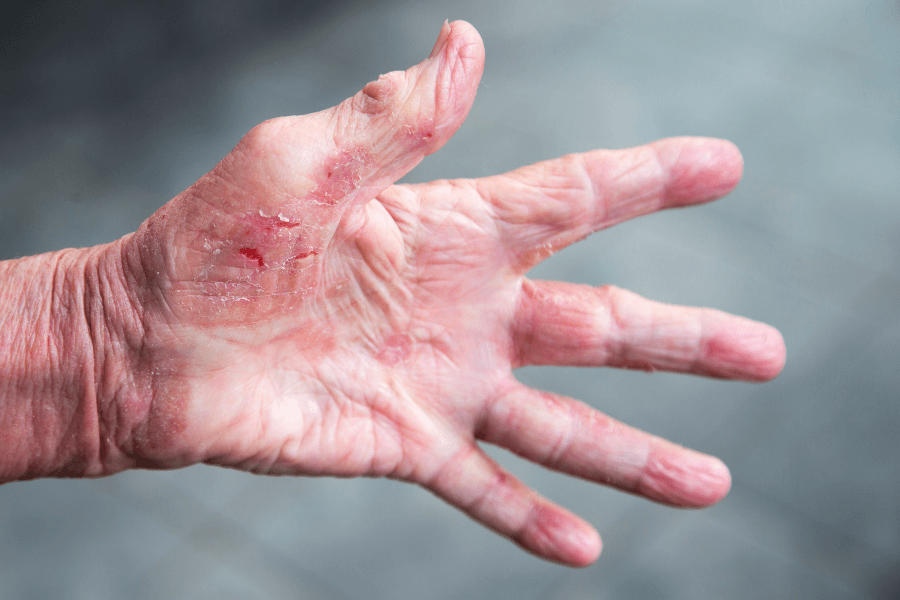
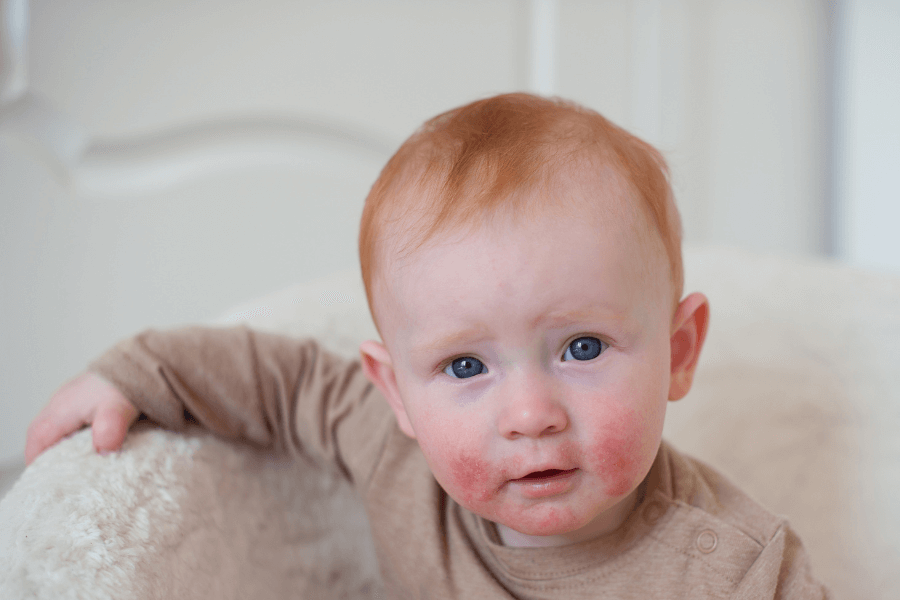
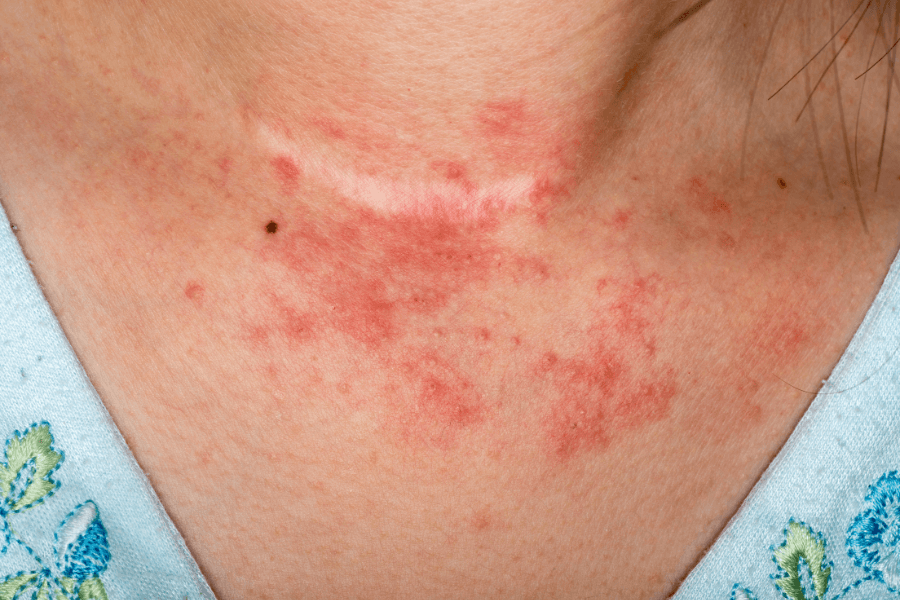
What is eczema and how can you recognise it?
There are several types of allergic skin diseases, among which eczema and urticaria are the most common. Eczema (atopic dermatitis) is a condition based on a genetic predisposition that involves extensive skin inflammation. It causes itching, dry skin, rashes, flaky patches, blisters, and skin infections. The condition is more common in children and infants who are not breastfed. In these cases, food allergies (e.g., milk, eggs) are predominantly involved, whereas in adults, nutritional causes account for only 10-15% of cases.
Eczema is not contagious and does not spread through contact!
So, what are the causes of eczema? What are the symptoms, and how can eczema be distinguished from other skin problems? How can it be treated?
Why does eczema develop?
Skin and scalp conditions almost always develop due to underlying complex issues. They are rarely caused by a single problem; usually, 4-5 factors contribute to the development of such skin conditions. What are these factors exactly?
The precise causes of eczema are still only partially understood. Many people may not understand that using inadequate skin and hair care products can cause or trigger common skin problems. Some opinions suggest that genetics is the primary factor, while others point to household dust or diet. Environmental, psychological factors, and other lifestyle characteristics can also play a role in the development of eczema.
Genetic predisposition also plays a role in the development of allergic diseases. The inherited tendency to develop allergies is known as atopy. In families with atopy, conditions like asthma, allergic rhinitis (hay fever), eczema (atopic dermatitis), and food allergies are much more common. If both parents have the same atopic condition, there is about an 80% chance that their children will also be affected.
Psychological factors also play a significant role. While 100% of skin conditions are not directly caused by psychological issues, these factors can trigger underlying conditions. Stress and unresolved emotional issues can be the final straw that can lead to the onset of such skin conditions. It is not just severe trauma that impacts the health, but prolonged stress and untreated emotional strain can damage our hormonal and nervous systems, contributing to trigering chronic inflammatory diseases.
Among all the factors listed, nutrition is suspected to have the closest connection to the development of eczema.
What Skin Symptoms Are Associated with Eczema?
It’s important to know that eczema and its symptoms can vary from person to person. Your eczema may not appear the same way on you as it does on another adult or child. Eczema almost always involves skin itching. Common symptoms include dry, sensitive, inflamed, and discolored skin. If your skin turns red, develops itchy small blisters, and then after scratching, you experience tiny wounds, scabs, and peeling, you are likely dealing with eczema.
In infants under 1 year old, eczema typically appears on the face, forehead, or scalp and can spread to the knees, elbows, and torso. In older children, eczema is usually seen in the folds of the elbows, behind the knees, on the neck, or on the inner parts of the wrists and ankles. Eczema in children may cause thicker, darker skin or scarring from scratching. Adults who had eczema in childhood but do not currently have the condition may still experience dry or easily irritated skin, hand eczema, and eyelid eczema.
In adults, eczema symptoms commonly appear in the creased areas, on the eyelids, forehead, and along the hairline. Other features may include cracking under the earlobes and a grayish-yellow skin tone. The limbs often feel cool, and a paradoxical whitening of the skin can be observed due to pressure on the skin.
According to experience, flare-ups of symptoms are influenced by factors such as emotional state, clothing (wool, synthetic fibers), chemicals, and certain skin infections.
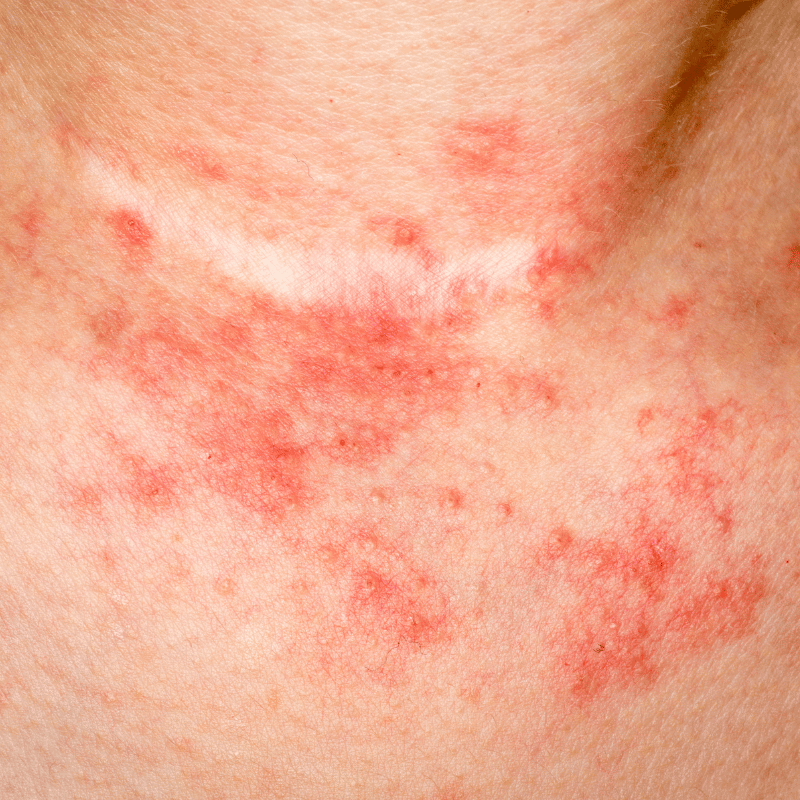
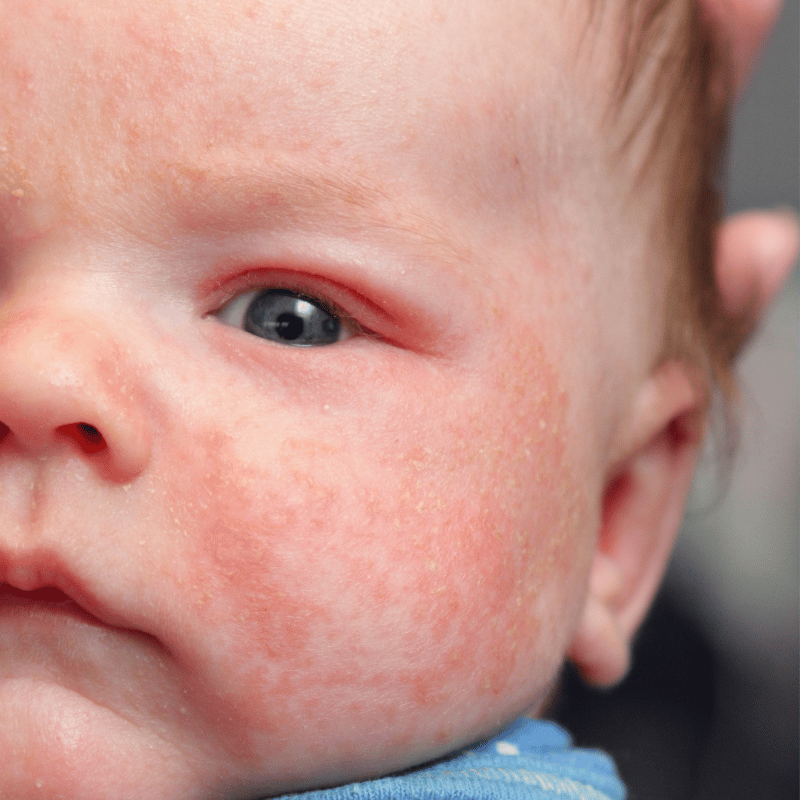
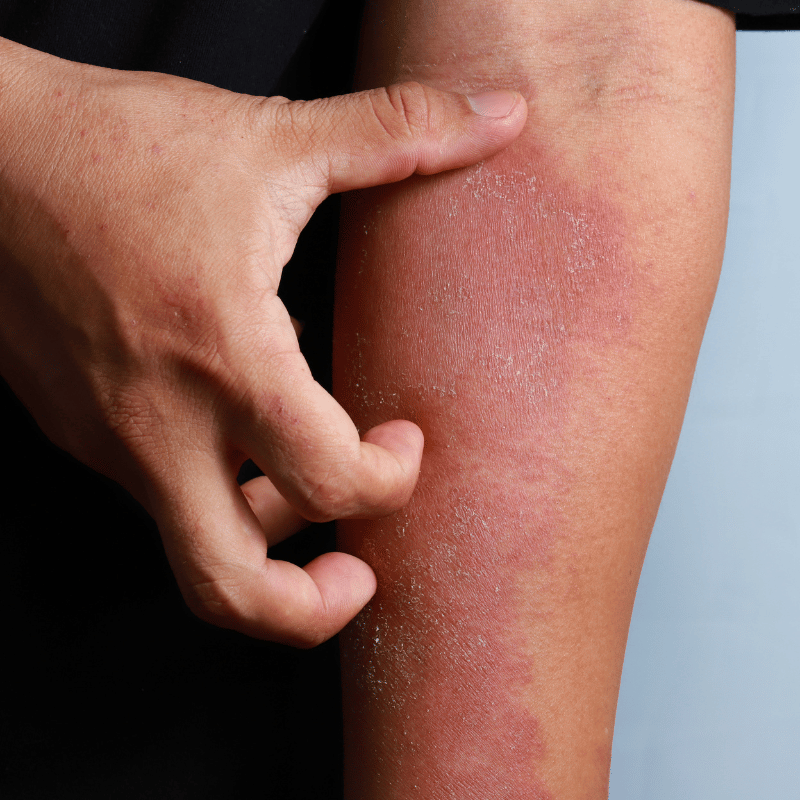
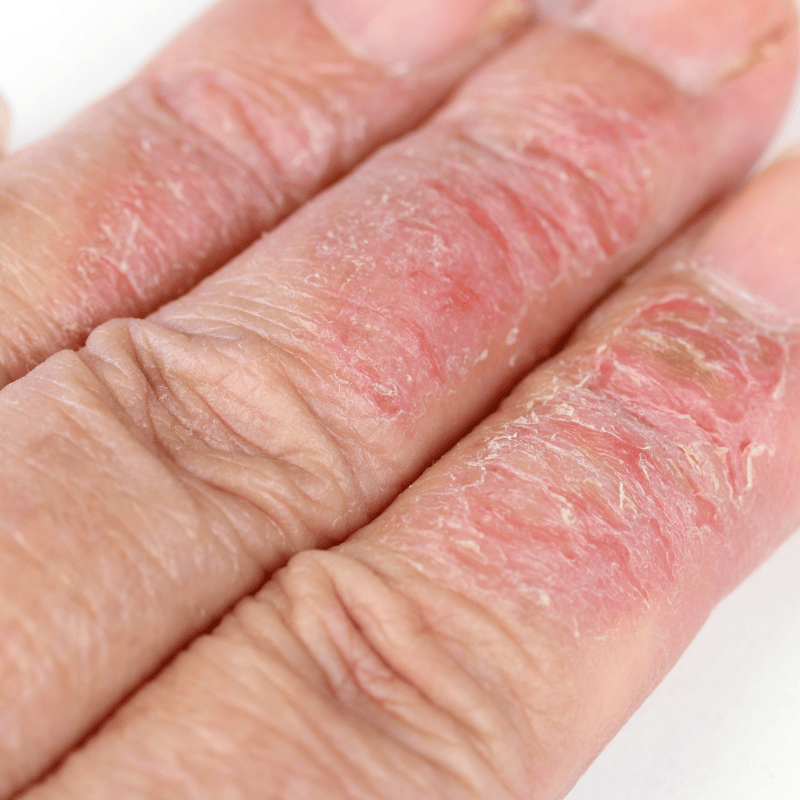
What Other Symptoms can accompany eczema?
- Swelling, digestive issues - constipation or diarrhea
- Dry and irritated skin all over the body
- Hormonal issues, difficult menstruation
- Hair loss, scalp itching
- Oily or excessively dry scalp, sebaceous gland function problems
- Lymphatic system stagnation
- Headaches, fatigue, irritability
Most Common Types of Eczema
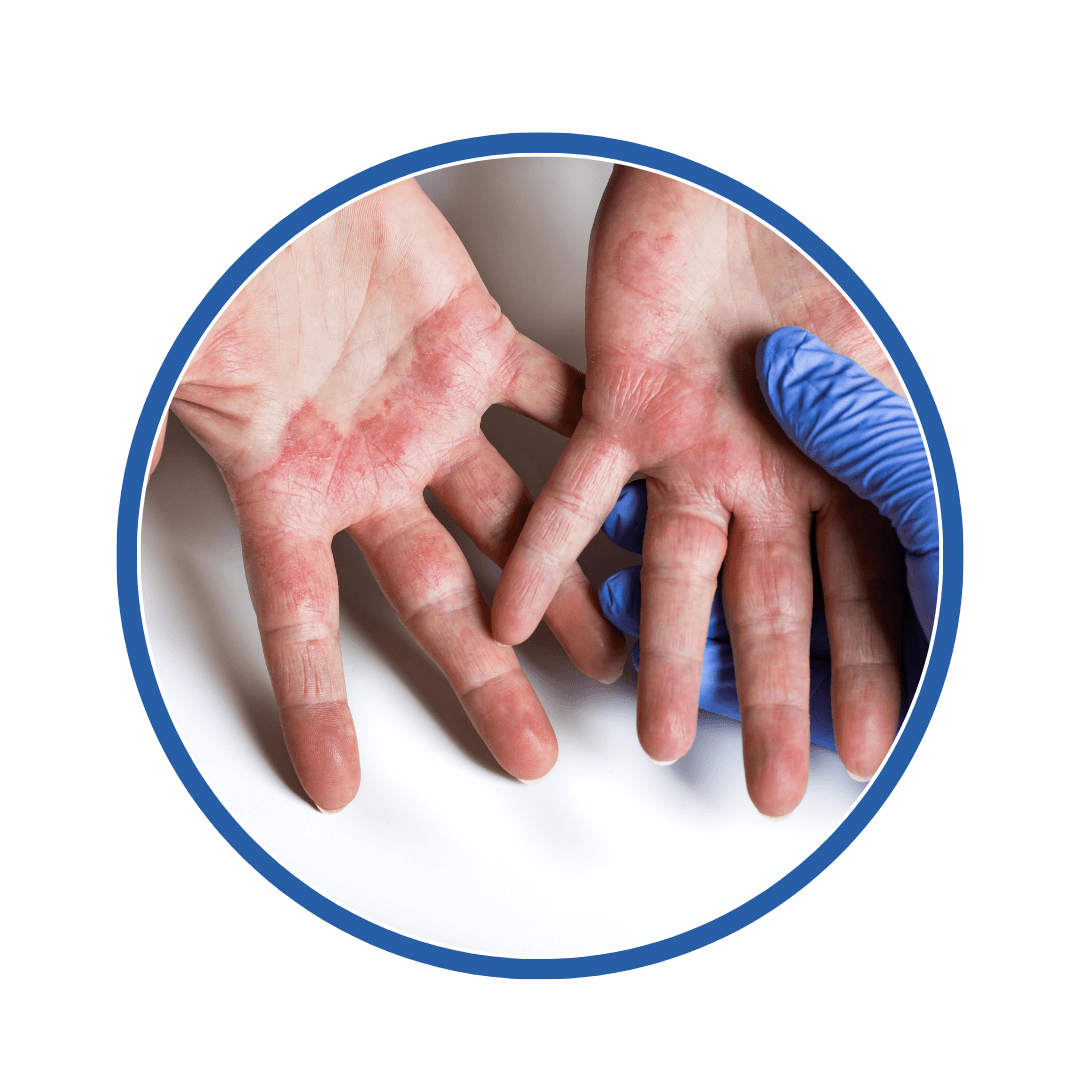
Atopic Eczema
Atopic dermatitis is the most common type of eczema, often starting in childhood but frequently persisting into adulthood. It is characterized by itchy, dry, red, and inflamed skin, usually appearing in the folds, on the face, and on the hands. It is often linked to genetic predisposition and an overreactive immune system.
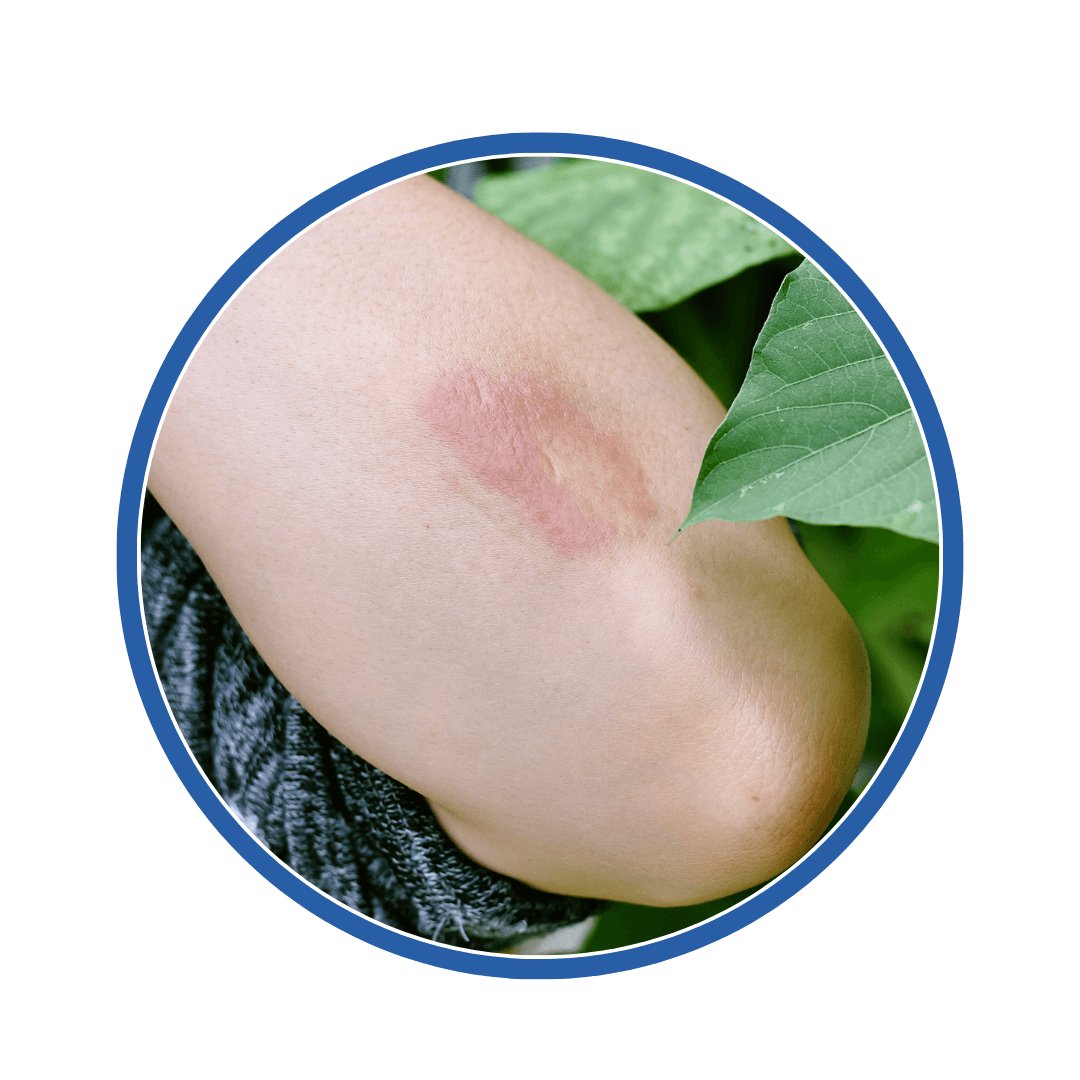
Contact Dermatitis
Contact Dermatitis occurs when the skin comes into direct contact with irritating or allergenic substances. There are two types: irritant contact dermatitis and allergic contact dermatitis. Irritant contact dermatitis is caused by chemicals (e.g., cleaners, soaps), while allergic contact dermatitis results from an allergic reaction to specific substances (e.g., nickel, fragrances, certain cosmetic ingredients). Symptoms include redness, swelling, itching, and blistering in the affected area.
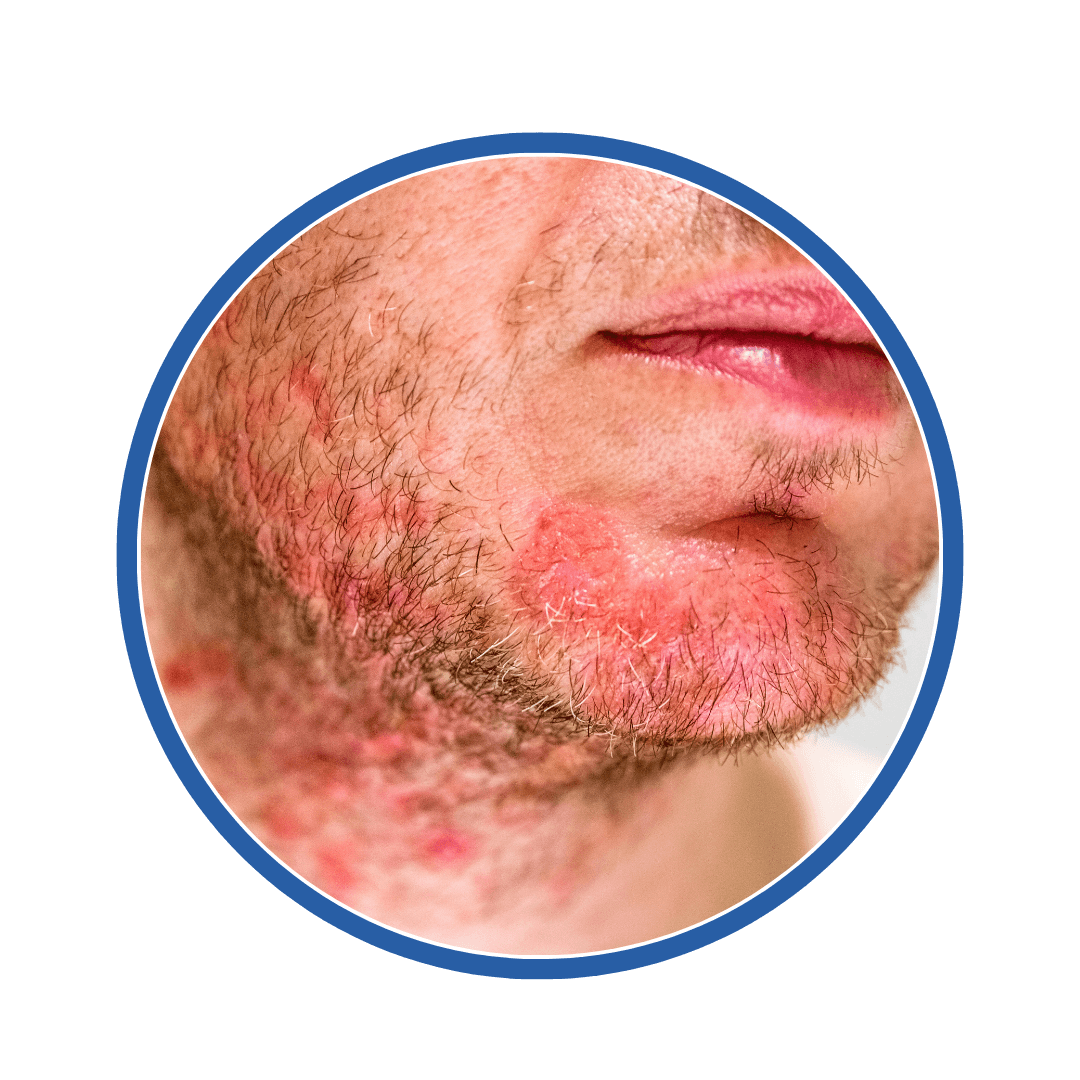
Seborrheic Dermatitis
This type of Eczema primarily affects the scalp but can also appear on the face, behind the ears, and on the chest. Seborrheic Dermatitis is characterized by oily, yellowish scales and red skin. It is often caused by hormonal changes, stress, or an overgrowth of yeast. Seborrheic dermatitis is a more severe form of dandruff and can be a recurring issue.
Additional Types: Dyshidrotic Eczema, Microbial Eczema, Photoallergic Eczema, Venous Eczema, Dryness-related Eczema (Asteatotic Eczema)
Eczema vs. Psoriasis: What's the Difference?
The main difference between eczema and psoriasis is that psoriasis is an autoimmune condition. Psoriasis causes inflamed skin patches that are usually thick, scaly, and grayish in color. These thickened patches, known as “plaques,” can be triggered by stress, bacterial, or viral infections. Neither condition is contagious! Both eczema and psoriasis may benefit from thermal water, aloe vera, saltwater, and sunlight for symptom relief. A healthy lifestyle and diet can also promote improvement. For both conditions, treatments that use 100% natural ingredients are recommended. Intolerances that disrupt the body’s natural processes can contribute to the development of both eczema and psoriasis.
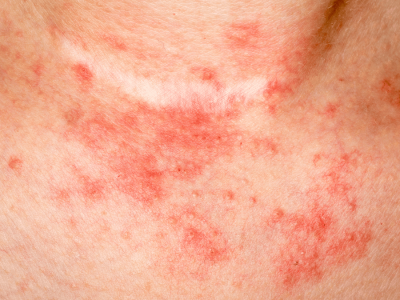
Symptoms of Eczema
- Red, inflamed areas
- Itching
- Present all over the body
- Associated with allergic reactions
- Recurrent
- Worsening after initial improvement
- Spreading
- Increasing patches in the same areas
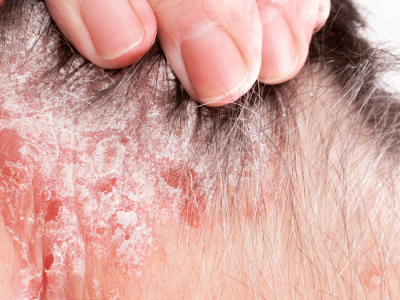
Symptoms of Psoriasis
- Inflamed, irritated, sore, shiny, red patches
- Scaly, whitish layers
- Can occur on any part of the body
- Itching
- Most commonly appear on the scalp, knees, back, elbows, and chest
Vitamin Deficiency: How Does It Relate to Eczema?

Vitamin D: A deficiency in vitamin D can contribute to the development of various skin conditions, including eczema and psoriasis. Vitamin D supports the normal functioning of skin cells and prevents excessive production, while also positively influencing the immune processes involved in the development of these skin conditions.

Magnesium: Magnesium deficiency can manifest on the skin through symptoms like acne, eczema, or psoriasis. It is beneficial to supplement magnesium with vitamin D, as magnesium helps regulate vitamin D, which is crucial for resolving inflammatory conditions. Without sufficient magnesium, vitamin D may become stored and inactive in the body, as it works synergistically with magnesium. Low magnesium levels can lead to vitamin D deficiency, which may exacerbate related issues.
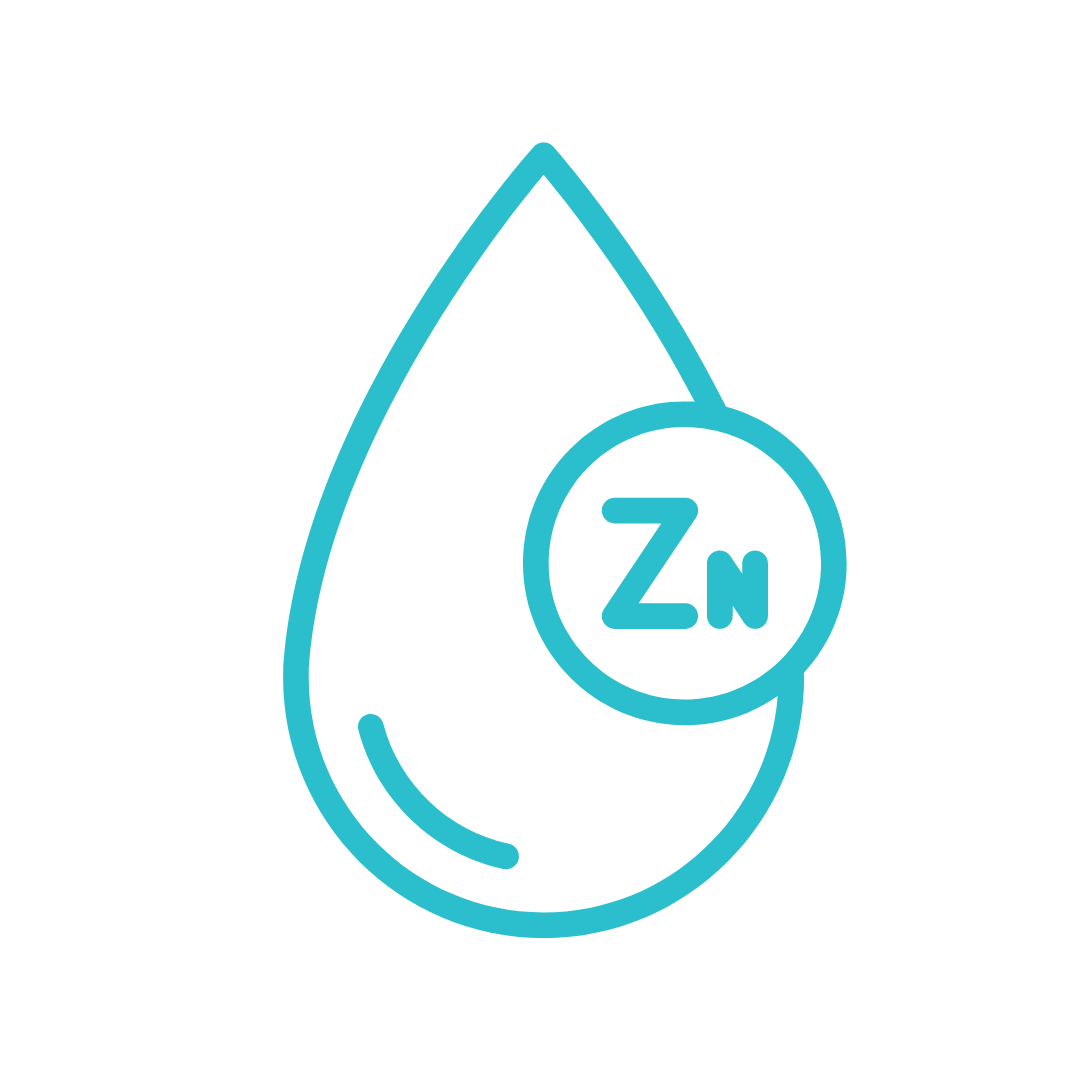
Zinc: A deficiency in zinc can lead to various skin problems, slower wound healing, and proneness to infections. It can affect the quality of hair, nails, and skin, making conditions like eczema more likely to develop.
Eczema and the Digestive System
Like many health issues, it’s important to support the efficient functioning of your digestive system when dealing with eczema. Proper digestion of consumed food reduces toxin buildup, which can lessen the impact of allergenic foods and decrease potential burdens on the immune system. Therefore, it’s crucial to avoid sugar and processed, ready-made, or fried foods.
Consider trying a detox program for the digestive system using products that support liver function. It’s also advisable to take probiotics (e.g., acidophilus) to restore the balance of your gut flora.
Eczema Symptoms Due to Diet?
Skin reactions triggered by food tend to be more common in adults compared to children. Common reactions include mouth burning, itching, and lip swelling, often observed 15-20 minutes after consuming raw plant-based foods. Besides these symptoms, other inflammatory skin reactions triggered by food allergens are also common.

What foods should we consider eliminating from our diet?
In severe eczema cases, it might be worth considering the elimination of chicken and beef, in addition to dairy and eggs, due to the similarity of allergenic proteins. Reducing the amount of animal proteins can improve eczema symptoms. Avoid artificial colorings (azo dyes), benzoate-based preservatives, and foods treated with sulfurous acid (e.g., coconut flakes, dried fruits, vegetable chips, horseradish).
For eczema in children, consider also reducing the intake of tomatoes, nuts, and fish due to higher risks. Recent research has highlighted that foods containing biogenic amines can produce allergy-like reactions, with histamine being a key player.

The main culprit: Histamine
In a healthy body, enzymes in the small intestine and liver immediately oxidize histamine and other amines from the consumed food before they enter the bloodstream. However, people sensitive to histamine often have disrupted mechanisms for this process.
A significant portion of the population suffers from histamine sensitivity, which can cause symptoms such as redness, pulsating headaches, high blood pressure, chronic hives, diarrhea, swelling, nasal congestion, itchy eyes, hoarseness, dizziness, and rapid heartbeat.
Symptoms after consuming sauerkraut (fermented cabbage) often indicate histamine sensitivity. Since bacteria produce histamine, fermented foods, as well as stored and stale foods, and preserved foods (spices, dried products) can also be problematic.
Medications such as blood pressure reducers, laxatives, hormone pills, contraceptives, and certain X-ray contrast agents can inhibit the breakdown enzyme. It’s essential to inform your doctor of any sensitivities. The situation is complicated by the fact that some drug derivatives can cause cross-reactions with aspirin. Among foods, chocolate is known to cause such reactions.
The Connection between Chemicals and Eczema
Cosmetics containing chemicals pose the greatest risk among household chemicals because they come into direct contact with our skin. About 90% of products on the market, such as shower gels, facial cleansers, body and face creams, and hair care products, contain chemicals that our bodies may not tolerate.
These chemicals are often responsible for red skin rashes, eczema symptoms, acne, pimples, and other skin problems. Therefore, it is advisable to carefully review the ingredient list of purchased products before applying them.
At the first sign of health issues, it’s best to immediately eliminate all conventional chemical-containing cosmetics and switch to 100% natural products.
Why is it important to aim for a chemical-free home and use chemical-free cosmetics?
Many illnesses and skin conditions are undoubtedly linked to chemicals that surround us daily. This includes cleaning products, cosmetics, and external factors like air pollution. Chemicals are also common causes of hair loss and various scalp problems.
Our skin reflects (acts as a “mirror” to) the processes and diseases happening inside our bodies. It reveals much more about our health than we might think, as our body communicates problems through visible symptoms on the skin. We should not ignore suspicious spots, rashes, or changes; often, the source of the problem lies in our lifestyle.
Effective skin care is not limited to external treatments. While various cosmetics and therapeutic products play a role, it is also crucial to nourish the skin from within and reduce risk factors by eliminating chemicals. Strengthening our immune system is important to protect our body from various illnesses, including skin diseases.
Harmful ingredients to avoid:
- SLS and SLES
- Silicones
- Synthetic colorants
- Fragrance
- Sodium chloride
- Petroleum derivatives
- Polymers (plastics)
- Aluminum salts
- Preservatives
- Palm oil
- Synthetic fragrances
- Polyethylene glycol / PEG, Polyethylene / Polyoxyethylene
- Parabens (Methylparaben, Ethylparaben, Butylparaben)
Eczema caused by stress?
Improper stress management is harmful in the short term and dangerous in the long term. Increasingly, young people are relying on medication for anxiety, sleep disorders, and other mental health issues, leading to prolonged use of antidepressants, sometimes for decades. Long-term use of these medications can have serious consequences, including hair loss, skin problems, digestive issues, and strain on various internal organs, which cannot clear out accumulated substances due to continuous intake.
How does stress affect the skin?
Even with a dedicated skincare routine, visits to a dermatologist, careful home care, and a healthy diet, excessive daily stress will eventually show on your skin, potentially leaving permanent marks.
Stress can cause gray discoloration, dry and flaky skin in some people, while others may experience unwanted acne, eczema, psoriasis, and rosacea. Additionally, stress can contribute to the formation of wrinkles.
Essential shanges only after stress relief!
One quick fix is to remove irritating substances and alcohol-containing skincare products from your routine, as they can exacerbate dryness and acne symptoms.
For sagging skin, home massages and facial yoga can be beneficial. These exercises stimulate facial muscles, smoothing wrinkles and increasing elasticity.
Managing and Reducing Stress
How to manage stress and its resulting discomforts and illnesses? The first step is to identify the source of your constant stress. However, this is often challenging, so it is beneficial to make changes to your quality of life and habits to broadly alleviate daily pressures, stress, and anxiety.

Exercise
Exercise releases endorphins, which help reduce stress and anxiety. Stress is often accompanied by muscle tension. Exercise can help relax muscles and reduce accumulated tension in the body, relieving the feeling of being “wound up.” Regular exercise improves sleep quality, circulation, digestion, and lowers cholesterol and blood pressure, often accompanied by psychological benefits.

Creative Hobbies
Creative hobbies can be effective in reducing stress by helping you escape daily worries, stimulate creativity, and allow for immersion. Consider making your own decorations, gifts, or trying various DIY projects that involve focused work. Listening to calming music, playing an instrument, or singing can also relieve stress. Going outdoors or exploring the city while photography can serve as a creative outlet.

Wellness
Visit a wellness center to enjoy massages, hot baths, saunas, and other relaxation therapies. These experiences can help unwind, release tension, and reduce stress.

Breathing Exercises
Breathing directly reflects the level of tension in your body. Conscious breathing can be very helpful. Even breathing reduces stress hormones in the body, lowers heart rate, and decreases blood pressure. In a relaxed state, breathing becomes fuller and deeper, engaging the abdominal area.

Meditation
Meditation helps you reach a state where you can slow down, release your thoughts, and focus solely on the present moment. This practice is particularly effective in the busy, goal-oriented Western societies that often struggle with the concept of “just being.”

Yoga
Yoga promotes the unity of mind, body, and spirit. While often viewed in the West as stretching, yoga encompasses a broad philosophy and a system for personal transformation. This includes a vegetarian diet, ethical codes, concentration and relaxation exercises, breathing techniques, and meditation.
Who is Affected by Eczema?
Eczema is commonly seen in young children, babies, and pregnant women. Often, eczema flare-ups are caused by internal intolerances—such as food intolerances—or immune disorders and deficiencies, where the body lacks necessary vitamins and nutrients. Digestive issues and absorption disorders also influence the development of the skin condition.
External factors, such as harsh products and creams containing artificial substances, can cause or worsen the condition. People using chemical-rich cleaning products, medications, or hormonal treatments are also more prone to eczema.
Individuals struggling with stress management and mental health issues, or those who have experienced trauma, are particularly vulnerable to developing any type of illness, including eczema. As previously mentioned, a deep-rooted psychological problem can 100% contribute to the development of a severe disease!

Pregnant women and children
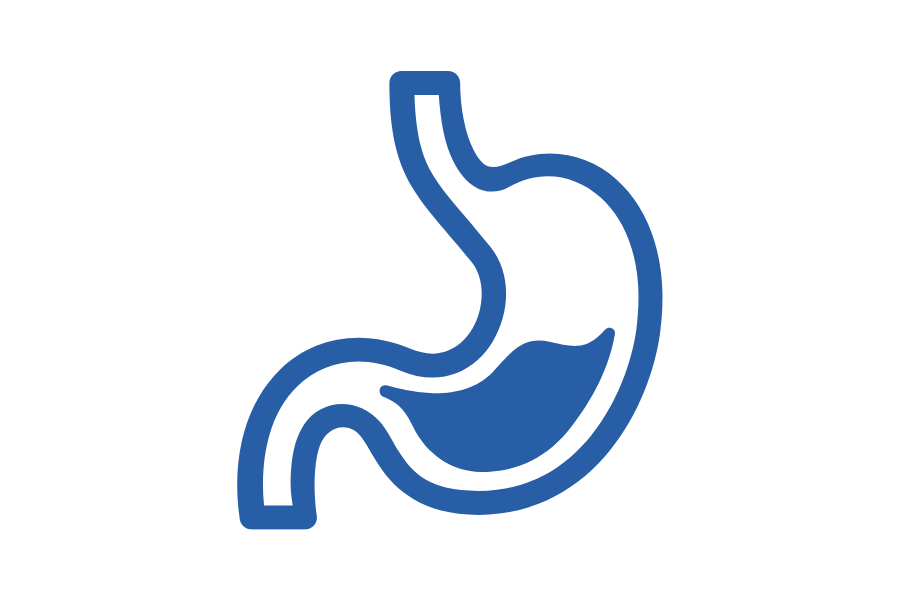
Those suffering from internal intolerances, immune disorders, or digestive problems

Those using chemical products and medications

Those struggling with stress management and psychological issues
What lab or medical tests are recommended for eczema?
- Food intolerance test
- Allergy test
- Celiac disease test
- Comprehensive blood panel + Hormone panel
- Insulin intolerance test
- Histamine sensitivity test
Inflammatory conditions in the body are not always detectable in lab tests, but they do exist! What can we do in such cases?
Eczema Treatment
1.
External Anti-Inflammatory Measures
Eczema is often triggered or aggravated by reactions to harsh skincare products. If you have eczema, you might be more sensitive to these reactions, which can provoke eczema symptoms. For lasting recovery, avoiding chemicals and using 100% natural products can be a long-term solution. The use of natural products can help not only alleviate symptoms but also in prevention. Additionally, it’s important to use complex, concentrated, and specific treatments, as complex problems require complex solutions.
2.
Avoid Aggressive Pharmaceutical Treatments and Opt for 100% Natural Alternatives
Nowadays, many treatments and products disguised as “medical solutions” promise quick and effective resolution of our problems. However, these often fall short or only provide relief for a few weeks to months before sometimes worsening the situation. Most treatments that involve injections or needles are designed to deliver active ingredients as deeply as possible. The danger lies in the fact that these substances are often not free from chemicals and may include aggressive pharmaceuticals or even become addictive for the skin.
There are numerous natural alternatives on the market that can replace some medications, including herbal teas, tinctures, adaptogenic herbs, superfoods, and more. To reduce the use of medications, the only lasting solution is lifestyle change!
For sustained recovery, avoid using chemicals and opt for 100% natural products for a long-term solution. The use of natural products not only helps in alleviating symptoms but also greatly assists in prevention!
3.
Digestive System Restoration and Absorption Disorder Correction
Our intestines are responsible for everything! In cases of deficiencies detected through lab or other tests, it is often due to inadequate “deficient” nutrition, but more frequently due to absorption disorders and improper functioning of the digestive system.
Taking large amounts of vitamins daily might not be the best solution, as an inflamed digestive tract cannot properly utilize them. The primary and most important step is to restore gut health and establish a diet rich in antioxidants and fibers. Avoid all pre-packaged “factory” foods and highly processed non-fresh foods!
We now know that certain foods can irritate our digestive system and cause inflammation in our body. Gluten, lactose, casein, egg white, and yeast are among the most common problematic food proteins. Unfortunately, over time, more and more proteins can cause inflammation if the underlying condition is not addressed in time.
4.
Anti-Inflammatory Diet
Lifestyle and lifestyle changes play a crucial role in skin conditions, including eczema. Have you noticed that on certain days or times of the day your eczema becomes particularly itchy and painful? It might be related to your diet. Diet significantly impacts the overall health of the skin. Understanding how different diets affect your skin can help minimize eczema symptoms.
Skin reactions to food sensitivities usually occur 6-24 hours after consuming the problematic food. To determine which foods are causing flare-ups, focus on common foods known to exacerbate eczema. These include wheat and gluten, citrus fruits, soy, grapes, broccoli, eggs, dairy products, tomatoes, dried fruits, avocado, spices (such as cinnamon and vanilla), and certain types of nuts.
Tips for managing eczema:
Regularly moisturize your skin. After bathing or showering, lock in moisture by applying moisturizer immediately to your skin.
Use exfoliating products for skin lacking proper epidermis to help remove dead skin cells.
Stay hydrated by drinking at least eight glasses of water each day. Water helps maintain your skin’s moisture levels.
Wear loose-fitting clothes made from cotton and other natural fibers. Wash new clothes before wearing them and avoid wool or synthetic fibers.
Address stress and emotional triggers. Seek professional help if you experience symptoms related to poor mental or emotional health.
Use a humidifier if dry air is causing your skin to dry out.
Avoid irritants and allergens that may trigger eczema flare-ups.
If you’re looking for an effective method to treat eczema, consider: oxygen therapy.
Eczema Treatment with Oxygen Therapy
Unfortunately, symptoms on the face and scalp are often interconnected, but eczema can also appear on different parts of the body.
Hair and cosmetic oxygen therapy is designed to boost the immune system, enabling customized treatments for various skin and scalp issues with guaranteed and visible results. The treatment is 100% reliable and risk-free, using exclusively natural ingredients.
Oxygen therapy offers an effective solution for eczema as it promotes skin regeneration and has anti-inflammatory properties. During the treatment, pure oxygen is delivered into the skin, which speeds up cell metabolism and improves blood circulation. This process aids in faster healing of damaged skin areas and alleviates itching and irritation caused by eczema.
Results of Oxygen Therapy:
How to Manage Eczema Symptoms at Home?
There are several effective methods for managing eczema symptoms at home. It’s important to regularly moisturize the skin with fragrance- and dye-free creams or natural oils like coconut oil or avocado oil. Natural ingredients such as aloe vera and honey can also be effective in eczema treatment due to their excellent anti-inflammatory and antibacterial properties. Additionally, avoiding factors that irritate the skin, such as harsh soaps, detergents, or synthetic materials, is crucial.

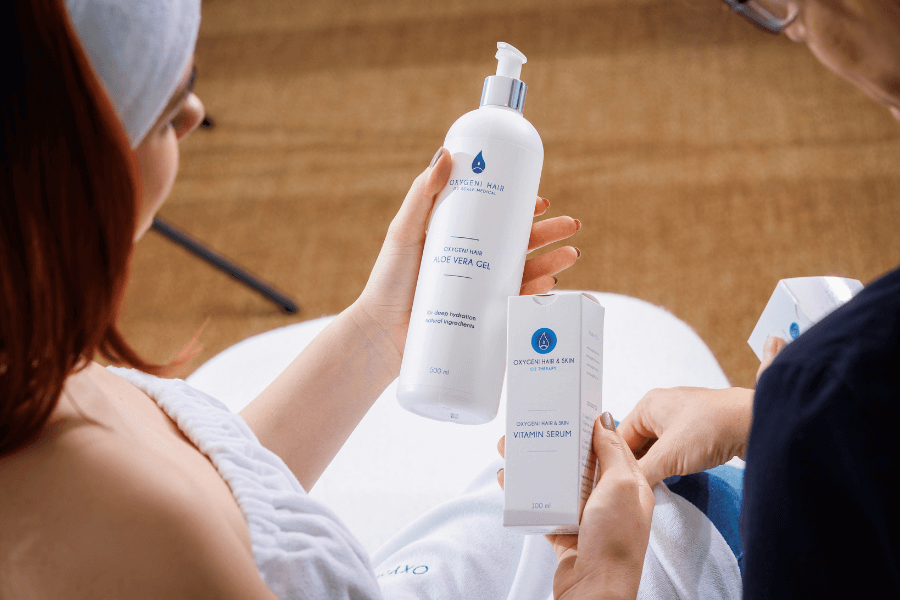
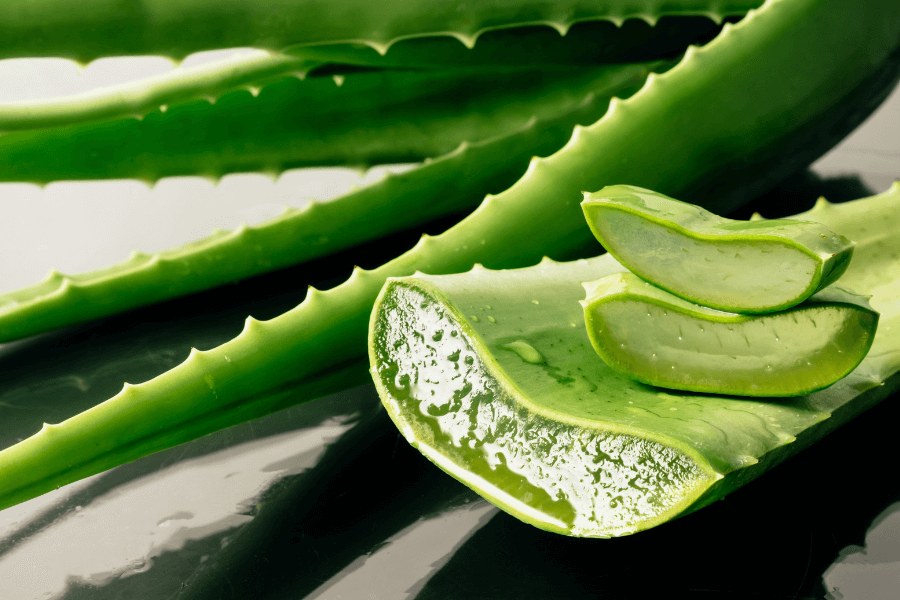
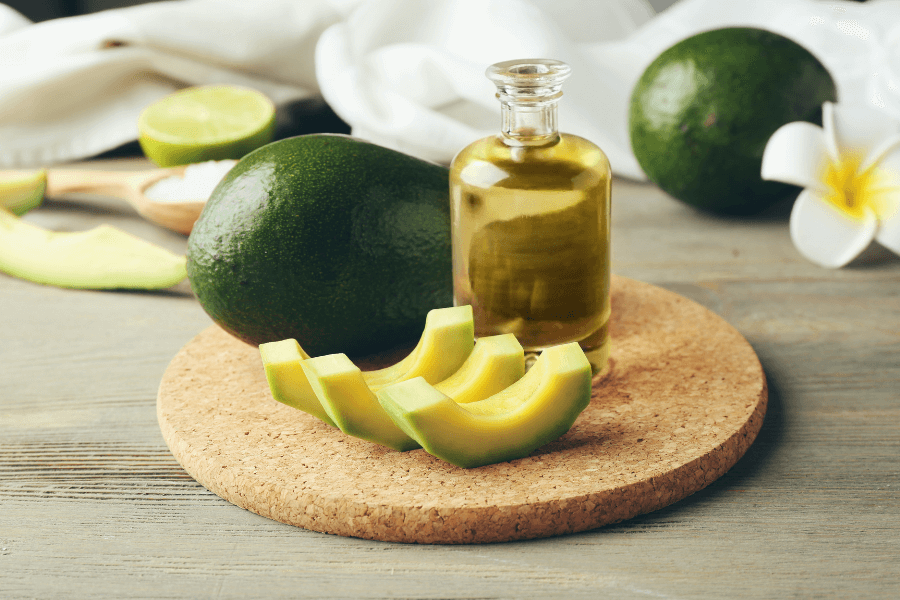
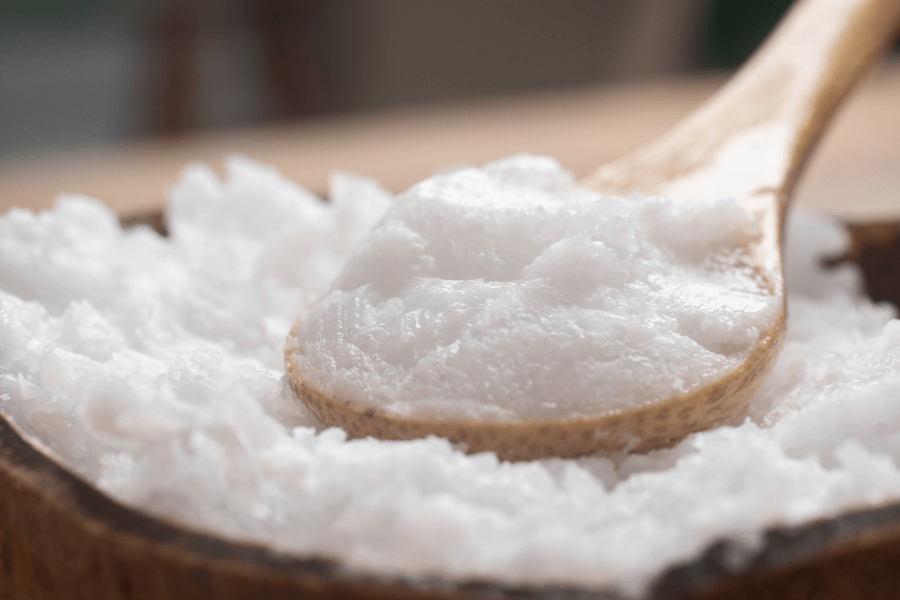
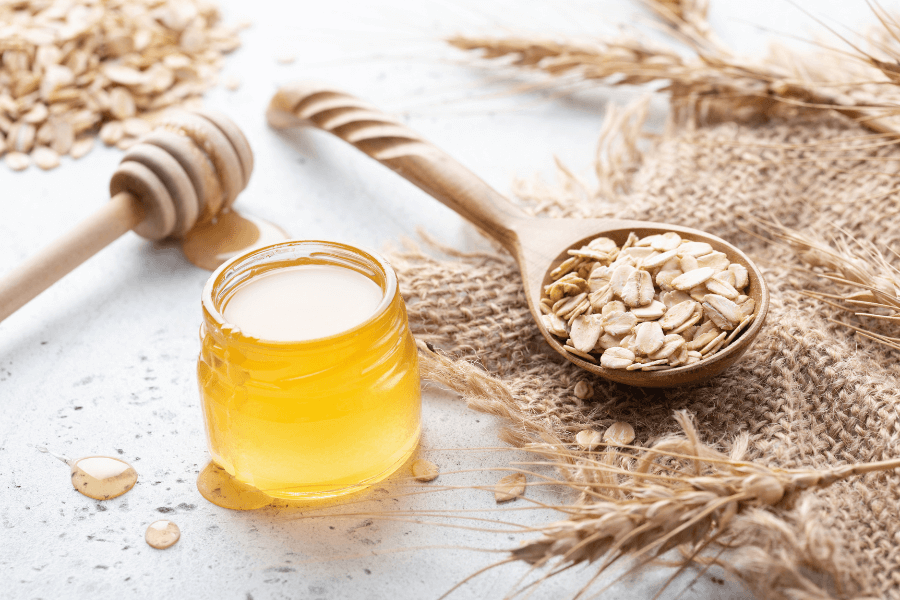
Natural ingredients for eczema treatment:
Aloe Vera: Aloe vera is widely known for its soothing and moisturizing properties, making it an excellent choice for treating eczema. It has natural anti-inflammatory effects that help alleviate itching and redness. Its high water content deeply hydrates the skin, promoting healing and protecting it from further irritation.
Coconut Oil: Rich in medium-chain fatty acids, coconut oil nourishes and hydrates dry, cracked skin. Its antimicrobial properties help prevent infections in affected areas. Additionally, its anti-inflammatory effects contribute to soothing the skin and reducing itching.
Avocado Oil: Avocado oil is packed with vitamins A, D, and E, as well as antioxidants that support skin regeneration and protection. It penetrates deeply into the skin, nourishing and hydrating it to alleviate dryness and irritation.
Honey: Honey is effective in eczema treatment due to its antibacterial and anti-inflammatory properties. It helps prevent infections, promotes wound healing, soothes dry, itchy skin, and aids in restoring skin health.
Oat: Oat in its natural colloidal form is particularly effective for easing eczema symptoms. Its antioxidants and anti-inflammatory compounds support skin regeneration and protection, enhancing the skin’s natural barrier.
Try Our 100% Natural Products!
Conventional cosmetics often contain chemicals that can irritate the skin, trigger allergic reactions, or cause skin issues. By switching to our products made with natural ingredients, your skin will thank you in the long run.
For eczema-prone skin, using natural cosmetics is crucial. The disease makes the skin sensitive, and using inadequate skincare products can worsen symptoms. Natural cosmetics are also environmentally friendly, as they are less harmful to the environment and contain eco-friendly ingredients.
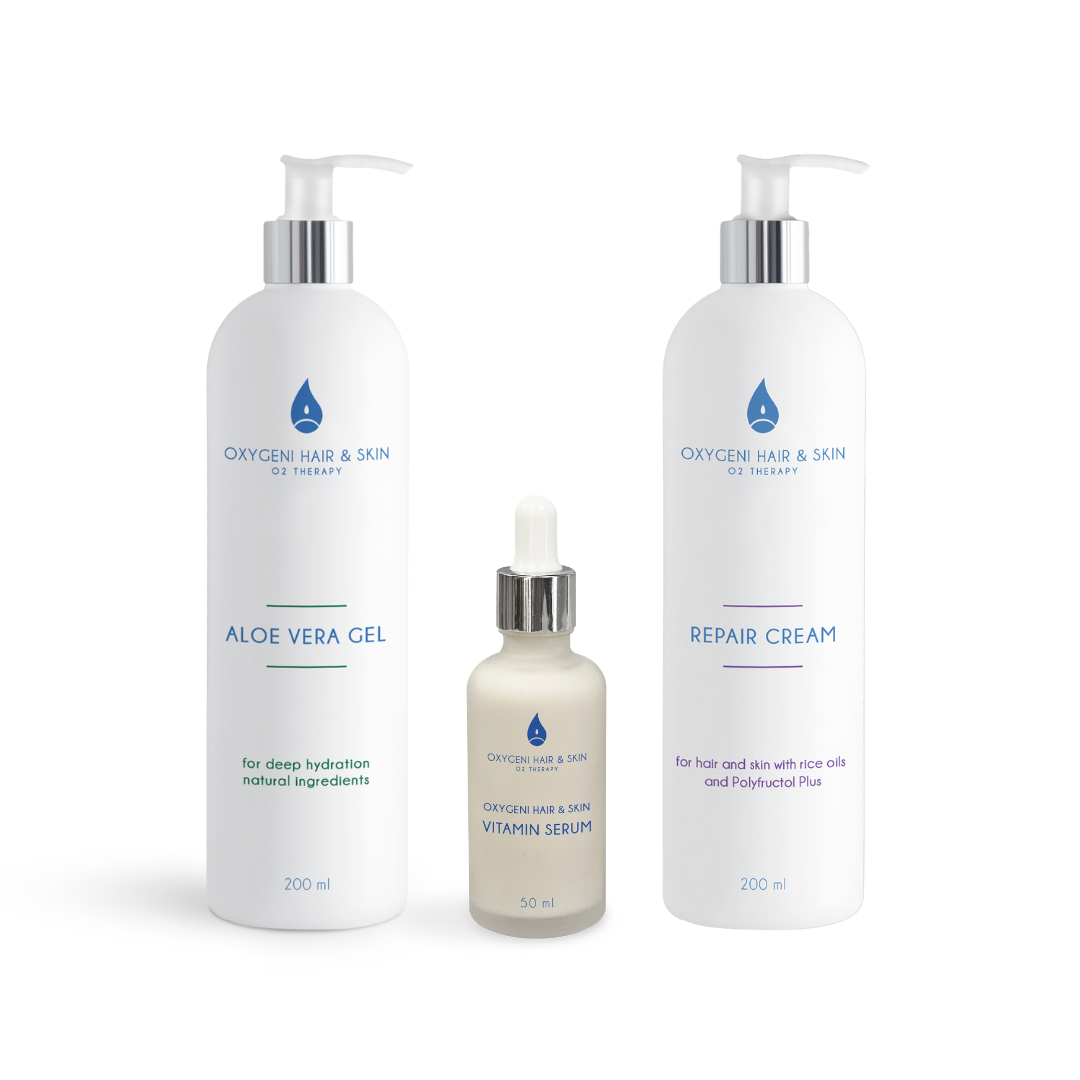
Recommended products for eczema treatment:
Thanks to its exfoliating effect, Aloe Vera Gel is the perfect solution for eczema-prone, skin lacking in moisture! What sets it apart from other aloe vera gels on the market? We make it from high-quality ingredients, and the active ingredients in the product effectively work on the skin.
Our Aloe Vera Gel is obtained from the aloe vera plant through cold pressing, intensely preserving all the beneficial properties of the plant, including its antibacterial, exfoliating, and anti-inflammatory properties.
It’s an excellent wound healer, which makes it applicable to wounds, irritations, fresh scars, and burns. Thanks to its anti-inflammatory properties, it treats reddened, inflamed skin areas.
Ingredients: Aqua, Aloe Barbadensis Leaf Juice Powder, Glycerin, Xanthan Gum, Polyglyceryl-10 Laurate, Citric Acid, Benzyl Alcohol, Salicylic Acid, Sorbic Acid
The Vitamin Serum contains vitamins and minerals that are most needed by the skin. A, B, C, E vitamins, and red grape antioxidants replenish the skin and its deep structure, revitalizing it, stimulating cells, and strengthening the skin’s resistance and immunity. An excellent source of magnesium and B vitamins, which help fight oxidative stress. Vitamin E exerts its protective effect by inhibiting the production of free radicals during cell oxidation processes and reducing their cell-damaging effects. It promotes collagen formation and improves cell renewal capacity. The Vitamin Serum is absorbed much faster and deeper with a carrier product, therefore we recommend using it simultaneously with Aloe Vera Gel.
Ingredients: Aqua, Glycerin, Caprylic/Capric Triglyceride, Panthenol, Ascorbyl palmitate, Retinyl palmitate, Helianthus annuus seed oil, Tocopherol, Vitis vinifera leaf extract, Niacinamid, Tocopheryl Acetate, Sucrose Stearate, Allantoin, Xanthan Gum, Sodium benzoate, Potassium sorbate, Benzyl Alcohol, Salicylic Acid, Sorbic Acid, Citric acid
The Repair Cream is a luxury skin and body care product that can be applied to all skin surfaces. Thanks to its content of rice, macadamia, grape, and flaxseed oils, it’s an amazing, nourishing product for the skin. Excellent for treating eczema, as it is a 100% chemical-free and natural moisturizing cream containing allergen-free fragrances. Our products are safe for the skin care of babies and expectant mothers.
Ingredients: Aqua, Aloe Barbadensis Leaf Juice Powder, Glycerin, Xanthan Gum, Polyglyceryl-10 Laurate, Citric Acid, Benzyl Alcohol, Salicylic Acid, Sorbic Acid
For the skin:
- Apply the Aloe Vera Gel to the affected area of the skin. Use as much as necessary!
- Then, depending on the size of the treated area, apply the Vitamin Serum to the eczematous area and thoroughly massage it together with the Aloe Vera Gel.
- Once absorbed into the skin, apply the Repair Cream! Apply the deeply nourishing and regenerative cream to treat the eczematous skin!
For the scalp:
- Mix 10 ml of Aloe Vera Gel with 1 pipette of Vitamin Serum in a spray-headed bottle and spray it onto your scalp on the problematic areas! No need to rinse off.
Sensitive Wash: This multifunctional product is recommended for sensitive skin and scalp. Thanks to its panthenol and pantothenic acid content, it reduces inflammation, treats dry skin, hydrates, and alleviates itching.
Hydrate Mask: Suitable for dry, eczema-irritated scalp and skin, this mask gently regenerates dry skin, scalp, and hair treated with chemicals. It provides intense care, has anti-inflammatory properties, and regulates moisture.
Med Oil: Contains natural vitamin E, one of the best skincare ingredients. It protects the skin from oxidative stress caused by environmental pollutants and harmful radiation. It is also promising for wound healing, aiding in the regeneration of new skin cells and offering anti-inflammatory benefits for extremely dry, eczema-prone skin.

